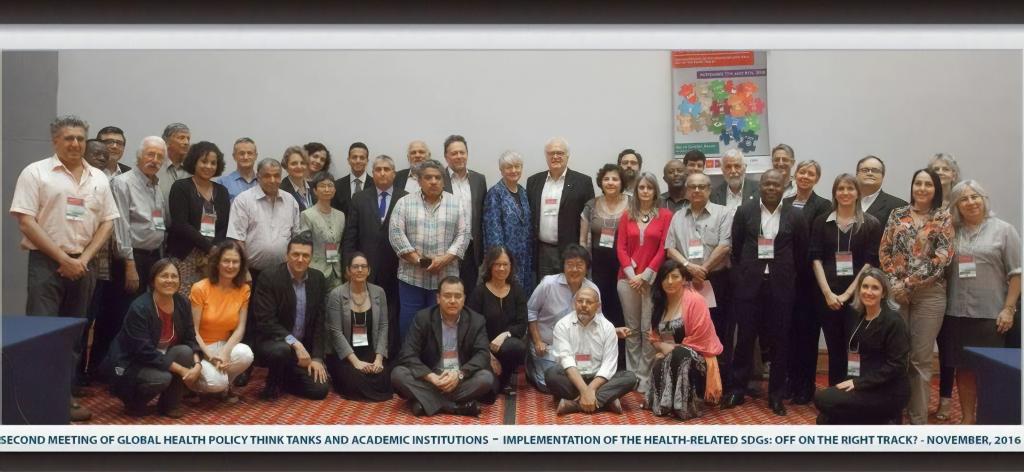The universal, transformative agenda of the global Sustainable Development Goals (SDGs) engages with people, planet and prosperity in ways that seek to ensure no one is left behind. But how will individual countries connect their national development processes to the global SDGs? What will the indicators and targets look like? How will these national efforts combine to inform progress towards the SDGs at a global level?
These are questions that have been exercising the minds of policymakers and researchers alike since the SDGs were launched at the end of 2015. As awareness of the SDGs grows amongst citizens in many countries, there is increasing interest and demand for information about the Goals, and how they may directly affect peoples’ lives. For an indication of what progress looks like in achieving Goal 3 in particular, Health and Well-being for All, consider the ways in which health and public health policies and systems are already being strengthened to frame actions. There is even greater interest in seeing what happens when these policies are implemented, and the systems are put into practice. There is also a powerful recognition that Goal 3 will not be achieved without progress being made towards the other, inter-related Goals, for example Goal 16 on accountable institutions and governance. Similarly, progress towards Goal 3 will contribute to progress across all of the other Goals.
All of this raises the challenge of how progress can be catalysed; this is precisely where policy research institutions, also known as think tanks, add real value. In November 2015, representatives of 60 global health policy think tanks and academic institutions from around the world met in Geneva to explore how they can help to accelerate the implementation of the SDG agenda on global health. As detailed in the December 2015 edition of this newsletter, the meeting revealed that think tanks and academic institutions are key players in the knowledge-policy interface for health, through high quality policy-relevant research and engagement, monitoring and tracking progress of policy implementation, convening spaces for policy dialogue, and bridging between national and global efforts related to the SDGs.
The November 2015 meeting generated enthusiasm and momentum to better understand what the role and contribution of policy research institutions could look like. As a result, the Graduate Institute and Canada’s International Development Research Centre (IDRC) convened a series of global and regional consultations. They have worked closely with several participants who attended the Geneva meeting (ACHEST, Uganda; SDPI, Pakistan; FioCRUZ, Brazil) to deepen the dialogue and widen the engagement to include other interested stakeholders such as national public health institutions, policy makers and funding agencies. Over the past year, consultations have taken place in Geneva, Berlin, Kampala, Rio de Janeiro, Vancouver, and Islamabad. They served as fantastic opportunities for sharing knowledge and experience, and also for generating ideas for collective action.
These events were guided by similar key questions
- How, in different countries and regions, are the health-related SDGs being integrated within national development plans?
- What is the need and role of data, evidence, and analysis in supporting efforts to make progress towards the health-related SDGs?
- What is, and can be in future, the role of think tanks and academic institutions in contributing to these efforts?
- How can these institutions collaborate, and be best supported, to make this contribution as effective as possible?
The meeting that took place in Rio de Janeiro in November 2016, hosted by the renowned Brazilian public health research institution FioCRUZ, was particularly significant. It brought together not only participants from across Central and South America, but also from the global public health community, including individuals who attended other regional consultations. This made it a truly global event and a natural successor to the first Geneva meeting.
Several key findings emerged from the deliberations amongst the 50 or so participants
- the futility of working on health in isolation of working on good governance;
- the intersectoral nature of the SDGs and the legitimacy this accords to a “health in all policies” and “determinants of health” approach;
- the moral and technical imperative of working at the community level directly with citizens; and
- the importance of adopting a territorial lens for understanding SDGs at the local level, where services come together and health is physically manifested.
Observations in Rio were very much in line with those that came out of the consultations in Kampala, Islamabad and Vancouver. Participants agreed to participate in further discussions about the role of think tanks and academic institutions regarding the health-related SDGs, which will include creating guiding principles for a new global network, THINK_SDGs, to help maintain the existing momentum and support engagement with wider audiences. Finally, FioCRUZ indicated their specific intention to make efforts for the implementation of the Agenda 2030, mobilising the national health institutes of Latin America and the academic institutions and think tanks of the region. We look forward to see how all these efforts help contribute to catalysing progress towards the health-related SDGs.
Written by Peter Taylor, Associate Director, Think Tank Initiatives, International Development Research Centre


